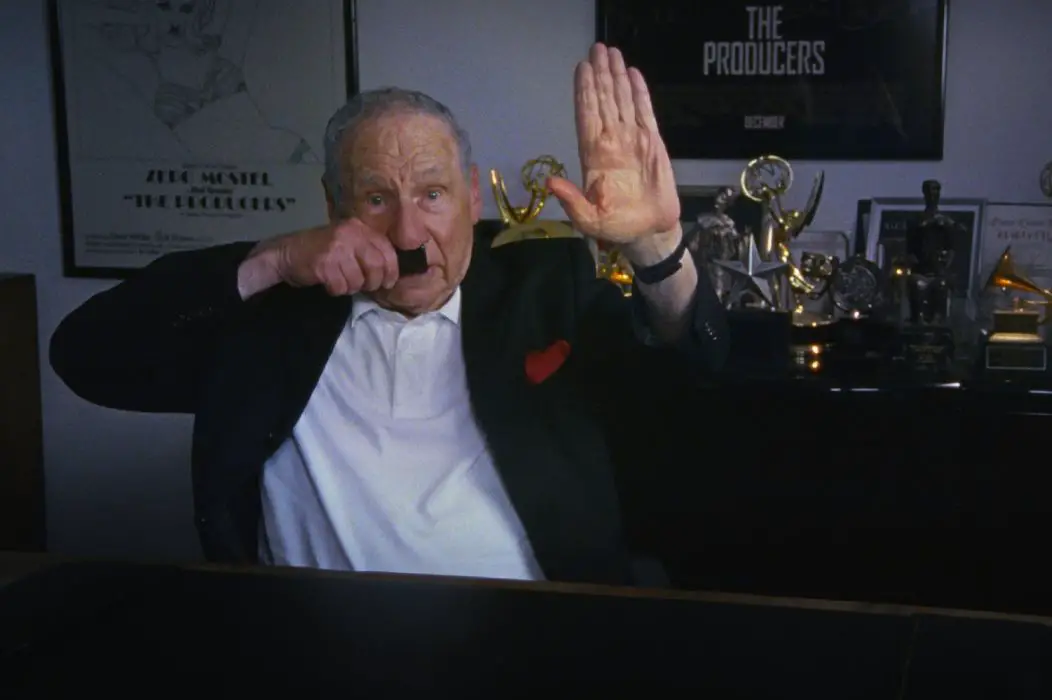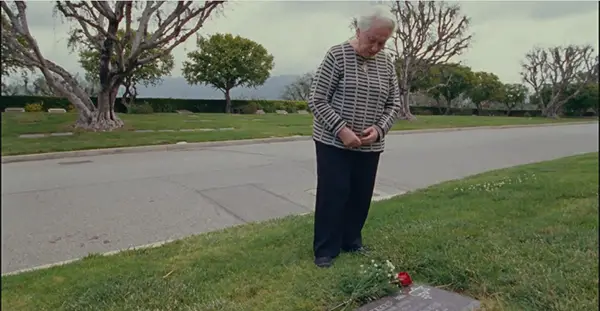THE LAST LAUGH: Comedy vs. The Holocaust

Brian Walter is a college professor by day and a…
Why do we laugh?
In his 1855 essay “On Laughter,” French poet and provocateur Charles Baudelaire argued that we laugh to show superiority to the object of our laughter. Baudelaire, in fact, scorned laughter as a “characteristic of fools” that always implies “ignorance or weakness.” He even described laughter as Satanic, “intimately bound up with the accident of an ancient fall, of a physical and moral degradation.” That is why, according to Baudelaire, the sage “trembles to laugh”: laughter is too primitive for one who seeks out and is in touch with the divine.
One wonders how Baudelaire would have responded to Ferne Pearlstein’s funny, touching, wise, and loving documentary, The Last Laugh, which explores the complicated moral and philosophical dimensions of comic responses to the indelible horrors of the Holocaust. Can we laugh at the unspeakable, and if so, how?
Comedian Commentators
Pearlstein posed this and related questions to a variety of smart, funny, thoughtful people whose personal ties to Judaism and the post-Holocaust Jewish experience deepen and complicate their responses — and ours to this film — in superbly challenging ways.
The commentator cast is impressive: Mel Brooks, Sarah Silverman, Abraham Foxman, Gilbert Gottfried, Judy Gold, Larry Charles, Robert Clary, Lisa Lampanelli, Harry Shearer, the Reiners (father Carl and son Rob), and many more. With their incisive comments, The Last Laugh helps us wrestle once again with the infamously incomprehensible obscenity of the Nazis’ attempt to use the tools and techniques of modern industrial factory-production to wipe out Jews. What is there to laugh at in genocide?
This talking head setup may seem obvious enough, but it lends The Last Laugh superb power right off the top. Our Mel Brookses and Sarah Silvermans have spent their entire lives being funny, making us laugh the moment they walk in the room or show up on our screens; for them, telling jokes (however ironized and deadpan, in Silverman’s case) comes as naturally — and needfully — as breathing.
But can they keep the jokes coming when the topic is the Holocaust? Or, more pointedly, can they not tell jokes even when the topic is the Holocaust?
Springtime for Brooks
Brooks is The Last Laugh’s delightful éminence grise (though he would, no doubt, make great fun of that term in this context), a child of the Depression who has been skewering Hitler and the Nazis with comic routines and films for half a century and more. Now 90, the irrepressible Brooks still keeps his comb ever at the ready to give himself a faux-führer’s mustache for his latest spur-of-the-moment caricature.

Brooks’s Catskills-veteran verve continues to use vintage show business techniques to expose the stagey superficiality of the Nazis, a cutting insight that goes back at least to Charlie Chaplin’s brilliant but complicated 1940 film, The Great Dictator. What better way to cut Nazism’s fundamental artifice down to humiliating size than with the incorrigible high-jinks of stage comedy?
But if he still can’t stop himself from making fun of the Nazi dictator, even Brooks comes up against the limits of his humor at several points in this film. And that’s where the comparison with Silverman proves so instructive. For Brooks, comedy remains a social experience, something one dresses up for to enjoy a night on the town in the club or theater. It lives and breathes and dances antically in the physical presence of other people.
Holocaust Smackdown?
But Silverman ingeniously and often disturbingly adapts her routines to the YouTube generation, who so often consume entertainment alone through their phones or text-sharing with their friends. Her techniques do less to create a sense of comedic community than to wither self-involved complacency and callowness, to expose the deep, even killing meanness of mean girl syndrome.

One of the most arresting scenes of The Last Laugh features a clip of Silverman hustling her ‘Holocaust erection’ over a rival’s in an all-too-plausible “Holocaust Memorial Smackdown” TV-spot. Silverman promises her patrons they won’t just say “Auschwitz”; no, with her, it’s “Wow-schwitz!” — much to the annoyance of her equally telegenic but grimacing rival.
Appreciating this routine requires a deeply layered, complicated sense of irony that Silverman knows the Internet generation is routinely criticized for totally lacking. But Silverman clearly doesn’t want anyone to miss her ironic undercutting; over and over again, in this and other routines featured in The Last Laugh, this superbly disciplined comedian adds extra tics and florid gestures, breaking her own rules to make these most painful jokes unmistakable. A comedian who generally refuses to pander or soften her razor-sharp stylings can’t help herself when the Nazi genocide serves as subtext (and text).
Survivor’s Wit
Director Pearlstein cuts from the queasy ‘Wow-schwitz’ clip to a lovely, touching sequence featuring 92-year-old Auschwitz survivor Renee Firestone placing a red rose at the grave of her husband. If Brooks is the film’s comedian emeritus, Firestone serves as its vital, beating heart, her moving memories and wise, sometimes acerbic wit coursing through The Last Laugh like lifeblood.
Pearlstein opens the film with Firestone at the remains of a Nazi bunker built in 1933, sharing a carefully-prepared box lunch with her daughter, Klara. When her daughter apologizes for using hands that might not be clean to serve her mother’s portion, Firestone jokes, “Auschwitz wasn’t clean,” prompting her daughter to respond, “I knew you were going to say that.”

This exchange perfectly illustrates and navigates the moral complexities of treating the Holocaust with humor. No one would consider Firestone’s quip in poor taste, because — like the black comedian who uses a racial slur to expose and disempower racism — her status as an authentic survivor means she’s not exploiting anyone else’s horror and victimization.
But perhaps still more importantly, if subtly, the joke serves to instruct and connect, to create a community based on the survival of inhuman horror. By inviting her daughter and us viewers into a moment of warm sympathy around her harrowing survival, she precisely rejects the inhumanity of genocide, which sunders us from one another and seeks to impose silence on the vital human voice and perspective.
In the Face of Oppression
Over and over again in The Last Laugh, Pearlstein returns to Firestone in a variety of settings to comment on, correct, deepen, and focus the comments of the comedians, and over and over again, she serves The Last Laugh beautifully. Quietly, simply, and warmly, she comes to wield an authority within the film and the viewer’s grateful imagination that extends far beyond the fact of her physical survival. She counters, grounds, and deepens the commentaries with a firm, innate sense of the imaginative stakes and necessity of testimony in the face of oppression.
Where Robin Williams once joked about an awful parenting moment that (supposedly) made him feel like Dr. Mengele, Firestone recounts an actual encounter with Auschwitz’s most notorious pseudo-medical torturer. And when she sincerely laughs — seven decades and more later — to recall the absurd irony of his parting and highly personal advice to her, we appreciate her ability to offer us this gift of connection, to use unspeakable horror to invite us into our lovingly shared humanness with her.
Mythos of Spring – and Winter?
In sequence after sequence, Firestone allows The Last Laugh to tread what could seem non-existent territory between horror and authentically, even exuberantly connective joy. Literary theorist Northrop Frye famously characterized comedy as the mythos of spring, the mode that affirms and renews life-cycles after the deathly blight of winter. With Firestone’s help, the film conjures visions of spring even as it subtly and superbly continues to evoke and preserve the stone-cold horrors of the Holocaust.
One of the most remarkably compelling scenes of The Last Laugh finds Firestone at a tony restaurant table with fellow Auschwitz survivor and Hogan’s Heroes alum Robert Clary. Over soup, Clary tells Firestone that he plans to be cremated and have his remains thrown in the ocean for the fish to eat.

Firestone immediately rejects the idea that a Jewish survivor of Auschwitz would request cremation. But as Clary continues to insist that he will do so (in part because of his parents’ fate), Firestone switches from telling him that he cannot do such a thing to saying that she, at least, could never do so. Her moral compass and remarkably, warmly human imagination work together perfectly, transitioning immediately from trying to impose her disapproval on her companion to deflecting her protest onto herself — a gesture of intuitive respect.
The Last Laugh is filled with scenes worth watching many times, but this is the one that I returned to again and again. What does it mean for a survivor of Auschwitz’s ovens to eventually choose cremation, even joking that the fish will unhappily discover that he’s not just French but has some Polish in him? What does it say about him, and the Holocaust, and us in our efforts to memorialize it?
No Easy Answers
The film offers no easy answers, and that is one of its most searching achievements. Firestone’s ability to reject the idea but still to return to her warm, respectful lunch conversation — to continue to make human company a joy — seems a marvelous gift for this film to offer us as viewers.
A pedant could probably assign some of the commentaries in this film to a lesser category than the others. One could also, perhaps, ask a skeptical question or two about some of the musical choices on the soundtrack. (The song that plays over the end credits perfectly fits one of The Last Laugh’s key themes, but the version chosen may well not work for many viewers — belted out by a famously shallow WASP-American pop star who seems as inimical to the immeasurable moral and intellectual gravity of the Holocaust as it is possible to be.)
But these are minor concerns in the face of the film’s impressive ability both to meaningfully evoke and update for the twenty-first century a historical horror that — as the passage of time requires — grows more remote in memory and more stylized in our imaginations. As a piece of filmmaking, this documentary weaves commentary, image, and subtle editing effects (particularly anticipatory sound bridges) into a compelling whole.
Facing the Gorgon
Auschwitz survivor and gifted writer Primo Levi posed this problem succinctly and superbly in his final and perhaps most brilliant book, The Drowned and the Saved: the survivors are not the ones who learned the full truth of the ‘Final Solution,’ because they survived only by some exception or improbable luck that makes all of their testimony suspect, at some level. Only the ones who descended to meet the Gorgon face-to-face, Levi famously and trenchantly argues, could tell the full truth of the Holocaust.
But with Firestone marvelously lending a human face and voice to the comedians’ attempts to wrestle with the intellectual and moral monstrosity of the Holocaust, The Last Laugh complicates this daunting insight of Levi’s. Her contributions highlight the benefits of bringing the historical horrors and traumas of the Holocaust into other fields of discourse that manage to find authentic joy and wit in survival that can bind us more closely one to another, regardless of the claims and disclaimers that unvarnished historical truth would impose.
Comedy and laughter in this film finally serve as the glue of human relations, the foundation of community. Perhaps Baudelaire would still insist that laughter is Satanic after seeing The Last Laugh, but if so, he would also have to say that human civilization is Satanic, for laughter has seldom seemed so warmly, meaningfully, and utterly, unavoidably human as it does both within and in response to this superb documentary.
What did you think of The Last Laugh?
The Last Laugh goes into limited US release on March 3rd.
Does content like this matter to you?
Become a Member and support film journalism. Unlock access to all of Film Inquiry`s great articles. Join a community of like-minded readers who are passionate about cinema - get access to our private members Network, give back to independent filmmakers, and more.
Brian Walter is a college professor by day and a hopelessly sleepy college professor by night. His work has appeared in a variety of literary and film studies publications, and he appears as an 'old coot' interviewer with a magic camera in the final chapter of Donald Harington's final novel, "Enduring." He lives a short walk from the St. Louis Zoo with his remarkably patient, loving wife and a quirky assortment of canine and feline familiars.












